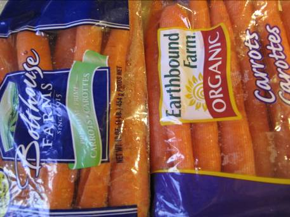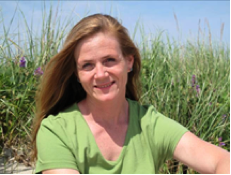Taking the Mystery out of Organic Food Labeling
by Katie O'Sullivan
It's Spring, and everyone's talking about "eating healthier" and "going organic." What does that really mean? For me it means eating more vegetables, getting more exercise, being more aware of the foods I choose to buy at the store.
The labels can be confusing. "Natural" – "Organically Grown" – "Certified Organic" – what does it mean? According to the organic farmers I know, "Natural" has absolutely no meaning other than to confuse consumers.

"There was a movement in recent years to start an alternative to Certified Organic," says organic farmer Tamara Flohr. She manages Valley Dream Farm in Cambridge, Vermont and has recently purchased her own farmland. "I think it was called "Natural" or something with Natural, because some growers were organic without wanting to have to pay all the extra certification fees." But she adds that without the certification, you really don't know if the farmer used chemicals or not.
Today at the supermarket, I had to choose between almost identical-looking bags of carrots. I picked the ones on the right, even though they were fifty cents more per bag, because they were labeled as organic. When you see the "Certified Organic" label at the supermarket, do you know what the farmer had to do in order to qualify for that label?
What does it mean to be Certified Organic?
- No toxic pesticides or herbicides may be used. At all. Land where organic food or fibers are grown must not have had prohibited substances applied (such as toxic and persistent chemical pesticides and fertilizers) for three years prior to certification.
- Carefully maintained and audited records must be kept. Farmers and processors must keep detailed records of methods and materials used in growing or processing organic products.
- Third-Party Certification must be obtained. A third-party certifier approved by the USDA must inspect methods and materials annually. (This means the farmer can't certify his or her own farm, to ensure compliance.)
- An "Organic Systems Plan" is required. All handlers and farmers are required to maintain an Organic Systems Plan (OSP) detailing their management practices. Which leads to the next question…
What is an Organic Systems Plan (OSP)?
Every farm that wants to be certified as organic is required to have an "Organic Systems Plan" (OSP) in place, outlining how their specific farm, with all its unique qualities, will meet the National Organic Program (NOP) standards. On most farms, that means using:
- Crop rotation: Alternating the types of crops grown in each field from year to year helps prevent the depletion of minerals in the soil and controls pests.
- Planting cover crops: Over-winter crops, such as clover, add nutrients and organic matter to the soil and help prevent weeds from taking root.
- Releasing beneficial insects and birds to prey on pests: Natural predators help to eliminate the need for the chemical insecticides that can remain in the soil for years or leach into our water supply.
- Adding composted manure and plant wastes: Amending the soil helps it retain moisture and nutrients.
- Preventative healthcare for animals: Animals can be raised organically, too. It makes good farming sense to maintain strong animals through good nutrition, natural health care — homeopathic, herbal remedies, and flower remedies — and minimal stress.
According to Tamara, organic costs more to the consumer because "those organic carrots were hand-weeded at least two times by people crawling on their hands and knees under July sun with bifocals to pick out every teeny weed, rather than just being sprayed with chemicals."
She adds that organic produce has a "much lower carbon footprint, for those counting those type of 'calories,' and though I'm not sure if it has really been proven, some studies do indicate that organics have higher nutrition values... you know from experience that they do taste better!"
Next time you see that "Certified Organic" label on the more expensive bag of carrots, remember how much harder that farmer had to work. Is it worth it? The choice is up to each of us.

Katie O'Sullivan is the Editor of this magazine. She lives in Harwich with her family.
In addition to reporting and editing, she writes contemporary fiction. Her second suspense novel, Perfect Strangers, is available in both paperback and e-book versions.
 |
